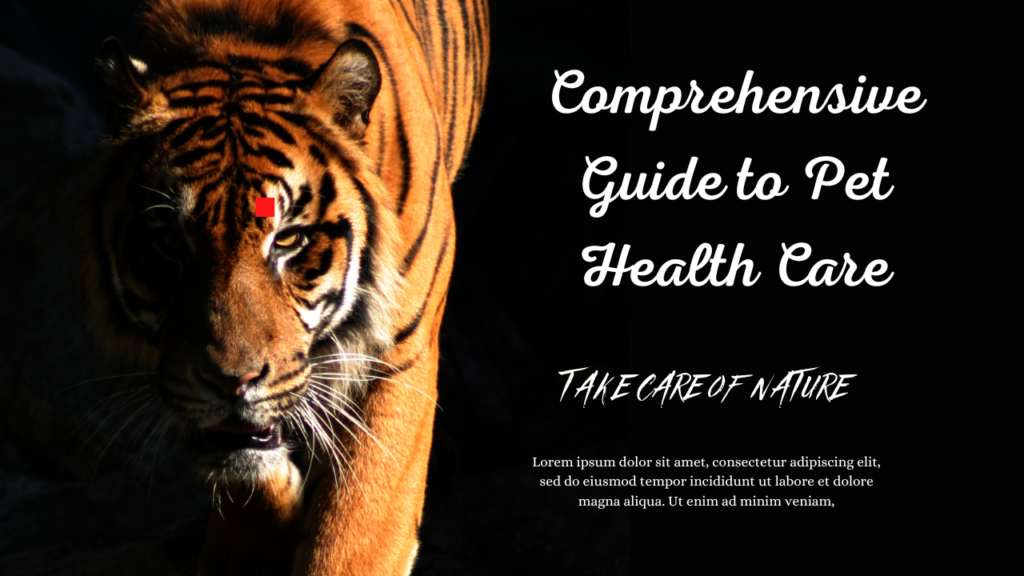
Pet ownership comes with a significant responsibility to ensure the well-being of your furry, feathered, or scaly companions. Pets depend on us for their physical and emotional needs, and proper care can lead to a long, healthy, and happy life.

This comprehensive guide covers essential aspects of pet health care, including nutrition, hygiene, physical activity, and regular veterinary visits.
Proper Nutrition
A balanced diet is crucial for the health of any pet. The nutritional needs of pets vary depending on their species, age, size, and health condition. For example, dogs require a mix of proteins, fats, carbohydrates, vitamins, and minerals, while cats need a higher protein intake due to their carnivorous nature. Small mammals like rabbits and guinea pigs have unique dietary requirements, including a constant supply of fresh hay for dental health and digestion.
It’s essential to choose high-quality pet food tailored to your pet’s specific needs. Avoid feeding pets human food, as it can lead to obesity and other health issues. Some human foods are toxic to pets, such as chocolate, onions, and grapes. Additionally, consider consulting with a veterinarian to determine if your pet needs any supplements, such as omega-3 fatty acids for a shiny coat or glucosamine for joint health.
Hygiene and Grooming
Maintaining proper hygiene is vital for preventing infections and other health problems. Regular bathing helps remove dirt, parasites, and allergens from your pet’s coat. Use pet-specific shampoos and conditioners to avoid irritating their skin. The frequency of baths depends on the type of pet and its lifestyle. For example, dogs that spend a lot of time outdoors may need more frequent baths than indoor cats.
Dental care is another crucial aspect of pet hygiene. Dental diseases are common in pets and can lead to severe health issues if left untreated. Brush your pet’s teeth regularly with pet-specific toothpaste to prevent plaque buildup. Providing dental chews and toys can also help maintain oral hygiene.
Nail trimming is essential to prevent overgrown nails, which can cause pain and difficulty walking. Be cautious while trimming nails, as cutting too close to the quick can cause bleeding. If you’re unsure how to trim your pet’s nails, consult a veterinarian or a professional groomer.
Physical Activity
Regular physical activity is vital for maintaining a pet’s physical and mental well-being. Exercise helps prevent obesity, promotes cardiovascular health, and reduces anxiety and destructive behaviors. The type and amount of exercise depend on the pet’s species, breed, age, and health condition.
Dogs benefit from daily walks, playtime, and interactive toys. Breeds with high energy levels, like Border Collies and Labrador Retrievers, require more vigorous exercise, such as running or agility training. Cats, while more independent, still need mental and physical stimulation. Engage them with toys, laser pointers, or climbing structures to keep them active.
For small mammals, provide ample space and opportunities for exercise. Guinea pigs and rabbits enjoy running around in a safe, enclosed area. Ensure they have access to toys and tunnels to explore and prevent boredom.
Regular Veterinary Care
Routine veterinary visits are essential for monitoring your pet’s health and catching potential issues early. Regular check-ups include vaccinations, parasite control, dental exams, and overall health assessments. Vaccinations protect pets from contagious diseases like rabies, distemper, and feline leukemia. Discuss with your veterinarian the appropriate vaccination schedule for your pet.
Parasite prevention is also crucial. Fleas, ticks, and heartworms can cause severe health issues if not addressed promptly. Use preventive treatments as recommended by your veterinarian, and regularly check your pet for signs of parasites.
In addition to routine care, be vigilant for signs of illness or discomfort in your pet. Changes in behavior, appetite, or appearance can indicate underlying health problems. Early detection and treatment can significantly improve your pet’s quality of life.
Conclusion
Taking care of a pet involves more than just providing food and shelter. It requires a commitment to their physical and emotional well-being. By ensuring proper nutrition, hygiene, exercise, and regular veterinary care, you can provide your pet with a healthy and fulfilling life. Remember, a well-cared-for pet is a happy pet, and the bond you share with them will be stronger and more rewarding.




